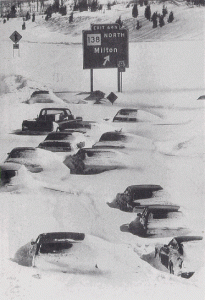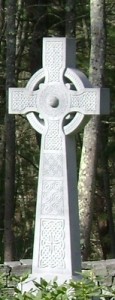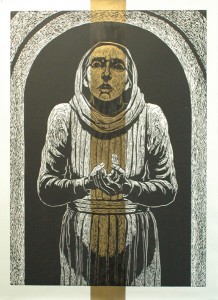
On February 6
th and 7
th 1978 a monster blizzard rocked the northeastern United States dropping over 30 inches of snow and paralyzing the region for days. When the morning of the forecasted storm dawned with no snow people thought the meteorologists had once again gotten the forecast wrong and they went about their day. People went to work and school, thousands of people filled the Boston Garden for a Bruins game and Monday, February 6
th seemed to be just like any other day. But people soon learned that it was not like any other day. Hundreds of cars were abandoned in roadways because the snow came so quickly. Plow trucks were overwhelmed and likewise had to be abandoned. Hundreds of hockey fans camped out in the Garden for days because they couldn’t get home. Everyone has a story about where they were when the blizzard hit because it was a once in a lifetime storm. Life came to a screeching halt because there was no other choice: All of New England was frozen in time.
Life happens at a sprint much of the time. We have places to go, people to see, and not enough time for any of it. Even when we’re relaxing we’re often doing so with one eye on the clock to make sure we get back to work on whatever it is that’s so important at the precise moment we need to. Lent is our invitation to intentionally throw 2 feet of snow on the ground and dig in our heels to walk a little more slowly for forty days. Lent is my favorite season of the church year.
I love Lent for its quiet simplicity: For the permission it gives us to slow down and take some time for introspection. I love the counter-cultural way that Lent seeps into our lives and forces a push and pull between what society says should be important and what God wants from us. Lent is an opportunity to live in the liminal space between the bustle of our earthly lives and the unknown awe of our eternal lives to come. Lent is one of the thin places.
Each year on Ash Wednesday I get a sense of solemn giddiness: for the next forty days we have permission to live in stillness with God: To live in the in-between. This is not to say that Lent is an easy time: as a penitential season, Lent calls us to examine our sins and all of the things that separate us from God and to repent of them. Lent marks the forty days of Jesus’ trials in the wilderness. Lent is a 40-day march to the cross in Jerusalem. As our collect of the day reminds us, Ash Wednesday invites us into the process of creating a new heart in Christ. It sounds like a painful and personal process, and it is.
It seems so odd in light of the gospel that we still go ahead and mark out foreheads on this day. Jesus plainly tells us that we must not be like the hypocrites who mourn and disfigure their faces in public, we should keep up appearances. Why then do we insist each year on marking our foreheads which a smudge of ash before resuming our normal daily activities? Therein lies the problem: the part about resuming our daily activities. Ash Wednesday is our invitation to something different -to do something more. Ash Wednesday is an invitation out of our daily lives and into a time of self-examination and inventory. This is where the tradition of “giving something up” or taking on a spiritual discipline comes in. It’s not an invitation to spiritualize our weight loss goals – nor is it the six-week reminder to start back in on our New Year’s resolutions that we’ve already forgotten. It is our opportunity to dig deep and ask ourselves what is missing from my life that will help me every day, every moment, to be closer to God? Or, asked differently, what is it that is blocking my march to Jerusalem with Christ?
This is where we look to our Psalm for this today. Lent isn’t about self-flagellation. It isn’t about one-upping the discipline we did last year. It isn’t about whose discipline is the most taxing. Lent is about recognizing and returning blessing. And the only way we can do that is to acknowledge our true nature, repent of the things that have distracted us, and give praise to the God who loves us through the whole process: from cradle to grave – From dust to dust.
In our day-to-day lives, how many of us truly take time out to sing our blessings to God? In our day-to-day routine, how many times do we stop beating ourselves up for the things we perceive we’ve fallen short on long enough to feel the mercy and loving-kindness that God is constantly sending out to us? How many times do we refuse to relinquish our perceived control and to give our dilemmas up to God before we are at the end of our ropes? That is why we go into the wilderness for 40 days. We go into the wilderness with Christ not to prove our piety or to “out Christian” the next person – we go into the wilderness because it is exhausting to keep pretending that we have everything completely under control.
So, if this is the case – that we aren’t participating in these Lenten practices for other people – then why do we mark our foreheads with ash when it seems so obvious that Jesus has warned us against these outward signs of our piety?
We do it as a reminder to ourselves. When our foreheads are marked we are told “Remember that you are dust, and to dust you shall return.” —We are dust— What a sobering and freeing thought. All of this racing around trying to stay on top of all of our obligations seems pretty irrelevant when we consider that we are dust. Not that we weredust…. we ARE dust … we were, we are, and we ever shall be dust.
When we stop and take a moment to really remember that we are dust, all of the other distractions seem to go away. That vital meeting that we need to prepare for, the report that was due last week, whatever it is… is it really that important?
 A few years ago at my childhood church they were putting the finishing touches on the column barium and memorial garden that had been years in the making. The last piece was an 8-foot high Celtic cross carved from limestone that was to be mounted on a pillar in the center of the space. When the planning committee contacted the artisan who was to carve the cross they asked if he would be willing to intentionally make a small mistake in the knot work. Traditional Celtic knots always include a mistake as an acknowledgement that God is the only true perfection. Making a mistake in the knot is recognizing our utter dependence on God because of our imperfect nature. The artist refused at first. After some coaxing, he agreed to carve the mistake only if the cross was mounted with the mistake facing the forest so that people examining pictures of his portfolio would not see it. On that spring afternoon as the crane lowered the heavy cross into place the head of the planning committee changed her mind. She stopped the crane operator and had him turn the cross around so that the mistake was facing forward. She wrote a note to the artist explaining what she had done and the theological reasoning behind it. You see, we must not be ashamed of our brokenness and imperfections because it is through that brokenness we find the strength to rely upon God.
A few years ago at my childhood church they were putting the finishing touches on the column barium and memorial garden that had been years in the making. The last piece was an 8-foot high Celtic cross carved from limestone that was to be mounted on a pillar in the center of the space. When the planning committee contacted the artisan who was to carve the cross they asked if he would be willing to intentionally make a small mistake in the knot work. Traditional Celtic knots always include a mistake as an acknowledgement that God is the only true perfection. Making a mistake in the knot is recognizing our utter dependence on God because of our imperfect nature. The artist refused at first. After some coaxing, he agreed to carve the mistake only if the cross was mounted with the mistake facing the forest so that people examining pictures of his portfolio would not see it. On that spring afternoon as the crane lowered the heavy cross into place the head of the planning committee changed her mind. She stopped the crane operator and had him turn the cross around so that the mistake was facing forward. She wrote a note to the artist explaining what she had done and the theological reasoning behind it. You see, we must not be ashamed of our brokenness and imperfections because it is through that brokenness we find the strength to rely upon God. Sometimes we move so quickly and, like those in the gospel passage, tout our piety because we want to hide our brokenness – even from ourselves. Today is a day when we stop, midair, and turn to face God with our mistakes and our brokenness as a mark on our foreheads to remind us that God is the only perfection and through our brokenness we will find the strength to rely on God.
The funny thing is, I studied that cross on numerous occasions and could never find the mistake. A fellow parishioner had to point it out. Just one small spot in the corner where the pattern should have gone over, under, over and instead went over, over, under. Tiny.

This past weekend we had a storm that the news stations were comparing to the fated Blizzard of ’78. They compared the wind speed, expected snowfall, temperature, and many other factors. But somehow, two days after the storm most of us had returned to work. Heck, 180 of you were in church on Sunday morning. We barely missed a beat because technology coupled with city infrastructure has the capacity to cope with these types of storms in a way we simply couldn’t 35 years ago. But, don’t you think it could have been a good thing to have an excuse for another day or two to slow down? I saw several people posting online that they were grateful for the excuse to sit home in front of the fire reading books, talking with family members, and gratefully blaming the governor’s travel ban for their inability to attend to their duties. But with lightening quick efficiency we are back running nearly at full steam. Today we have an invitation that isn’t physically limiting like a blizzard, but it can be even more powerful a force if we let it. Today, God is inviting us to sit down for a while. Will you accept the invitation?






Recent Comments